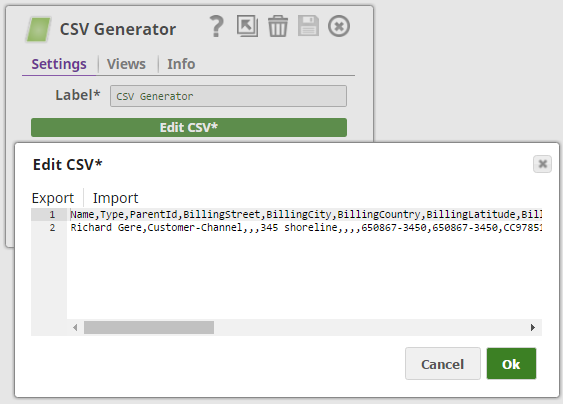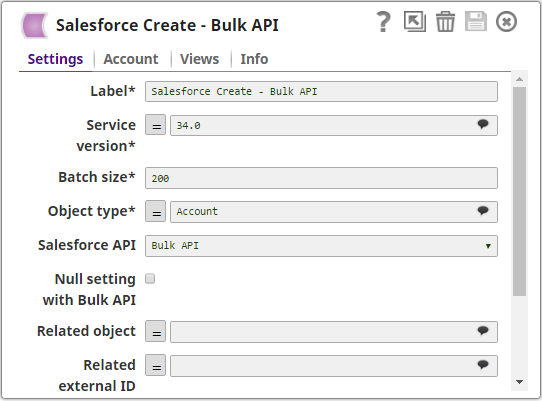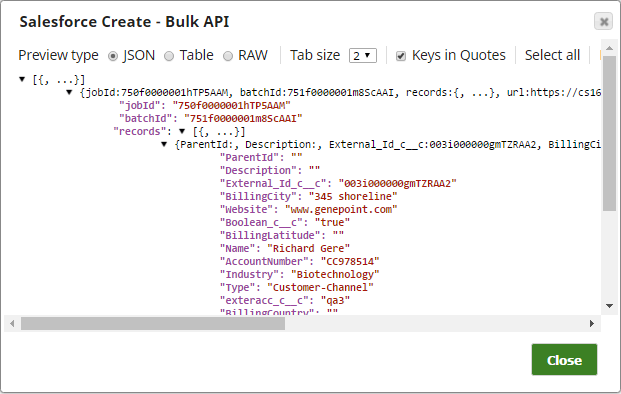Snap type: | Write
| |||||||
|---|---|---|---|---|---|---|---|---|
Description: | This Snap provides the functionality to create object records in Salesforce in asynchronous mode. The Snap in Salesforce Bulk API mode submits batch jobs and sends the batch job information to the output view for the Salesforce Poller Snap. The Snap in REST API mode creates Salesforce objects and returns results synchronously without the need of the Salesforce Poller Snap. | |||||||
| Prerequisites: | None
| |||||||
| Support and limitations: |
| |||||||
| Account: | This Snap uses account references created on the Accounts page of SnapLogic Manager to handle access to this endpoint. See Salesforce Account for information on setting up this type of account. | |||||||
| Views: |
| |||||||
Settings | ||||||||
Label Required.
| The name for the Snap. You can modify this to be more specific, especially if you have more than one of the same Snap in your pipeline. | |||||||
Service version
| The version number associated with the Salesforce service that you want to connect to."v34.0" for REST API or "34.0" for Bulk API
| |||||||
Batch size | Refers to large record sets that require Reads in batches. Each batch Read requires an API call against Salesforce to retrieve the set of records. Increasing the batch size increases the amount of memory used during retrieval. Decreasing the batch size increases the number of API calls against Salesforce. Set to a value of 2000 or less for REST API execution. Set to a value greater than 2000 but less than or equal to 10000 for Bulk API. | |||||||
Object type | This property enables you to define the name of the Salesforce object, such as Account. Example: Account | |||||||
Salesforce API Required. | This property sets the Salesforce API mode to Bulk API or REST API. The Snap in REST API mode creates one record at a time and returns the results at the output. REST API can be simpler and faster if the number of records to be created is small (a few).
| |||||||
Null setting with Bulk API
| If selected, in Bulk API mode, null values in the input document can set nullable fields null in the Salesforce object. Default value: False | |||||||
Related object
| Enter or select a related parent object. This property does not affect the Snap operation on records in Salesforce. It is provided for the property suggest and the input schema suggest only. Example: Account Default value:[None] | |||||||
Related external ID | Enter or select an external ID of the selected related parent object. This property does not affect the Snap operation on records in Salesforce. It is provided for the property suggest and the input schema suggests only. Example: AccountNumber__c Default value: [None] | |||||||
Bulk API Serial mode
| If selected, Bulk API will run in Serial mode. If not selected, Bulk API will run in Parallel mode. This is only relevant to BULK API. Default value: Not selected (Parallel mode) | |||||||
Standardize error output | If checked, the Snap will produce the error output with Reason, Original, Stack trace and Resolution. If unchecked the output view will simply show the input document along with the error message. Default value: Not selected
| |||||||
Pass through | If selected, the input document will be passed through to the output view under the key 'original'. This property applies to REST API only. Default value: Selected
| |||||||
Execute during preview | This property enables you to execute the Snap during the Save operation so that the output view can produce the preview data. Default value: Not selected
| |||||||
Examples
Sample Salesforce Pipeline: This pipeline uses several Salesforce Snaps to perform create, updated, delete, & lookup actions on Salesforce object records.
The following is another example that shows how to create a new record in a Salesforce object:
In the above pipeline execution:
- Object record details are provided to Salesforce Create Snap using a CSV Generator Snap:
- The Salesforce Create Snap creates a new record in the Account object:
Successful execution of the Snap gives the following preview:
4.7.0
- Updated the Snap with 'Standardize error output' field.
4.5.1
- Extended support for specifying Output fields and Where clause.



